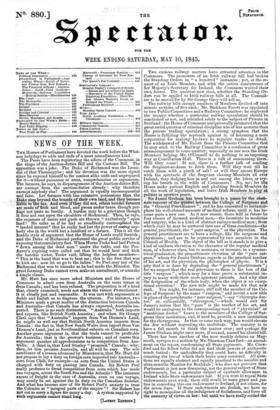NEWS OF THE WEEK.
THE Houses of Parlia.menthave devoted the week before the Whit- sun holydays to odds and ends of a most miscellaneous kind. THE Houses of Parlia.menthave devoted the week before the Whit- sun holydays to odds and ends of a most miscellaneous kind. ' The Peers have been registering the edicts of the Commons, in the shape of the Auction-duties Bill and the Customs Bill. The opposition was a joke.. The Duke of Richmond was the Leoni- das of that ThermOpyhe • and his devotion was the more signal since he exposed himself the contest alike unfit and unprepared for it--without puissance or arms, comprehension or arguments. The farmers, he says, in disparagement of the Auction-duties Bill, are exempt. from the -auction-duties already: why therefore exempt anybody-else? The argument is equally inconsequential and false. Let farmers with less extensive possessions than the Duke step beyond the bounds of their own land, and they become liable to the tax. And even if they did not, others besides farmers are made of flesh andblood, and groan under taxes, though per- haps not quite so lustily. A burden may be a grievance though it does not rest upon the shoulders of Richmond. Then, he says, the expenses of assize and gaols are thrown " exclusively"- upon land He talks as if he had so steadfastly contemplated the "landed interest" that he really- had lost the power of seeing any- body else in the world but a landlord or a farmer. This is all the hostile style of argument that the House of Lords could furnish ; Said the Duke of Richmond performed the great public service Of exposing that consolatory fact. When Horne Tooke had laid Porson
down among. the dead men" under the table, and the Pro-. fessor's expiring voice called out that he would beat and kick the liaodhie 'victor, Tooke Said, lifting the helpless members- " This is the hand that was to beat me; this is the foot that was to kick me : now let us go to the lathes." So Peel may say of the Richmond that was to unmake as he had made the Minister. The great farming Duke cannot even make an amendment, or unmake a single clause.
Mr. Hutt has once more asked Ministers and the House of Commons to admit corn from Australia on the same terms as from Canada; and has been refused. The proposition is of a kind that, closely examined, needs not alarm the veriest Protectionist : it is clearly just and reasonable. It was met with arguments so feeble and foolish as to disgrace the utterers. For instance, two Ministers made a great matter of the distinction between Canada and Australia—that Canada has always exported, Australia im- ported. There is no such distinction. "Australia" both imports and exports, like British North America • and when Sir George Clerk says that "Australia" imports from Van Dienaen's Land, he might as well say that British North America imports from Canada : the fact is, that New South Wales does import from Van Diemen's Land, just as Newfoundland subsists on Canadian corn. Another grave argument is, that the trade cannot be profitable for Australia : that is the grower's business ; and of course this argument quashes all apprehensions as to competition from Aus- a. A third is, that -Lord Stanley "promised" Canada: why, then, let him promise Australia, and all will be easy. The sole semblance of a reason advanced by Ministers is, that Mr. Hutt did not propose to lay a duty on foreign corn imported into Australia— corn from Chili, for example—as corn from the United States is charged with duty on passing into Canada. Sir Robert Peel really professes to dread competition from corn which has made two voyages, across the South Sea and the Atlantic I The immense' excess Of freight in the case of Australia, even on one voyage; may surely be set against the 3s. duty on the Canadian frontier. And what has become now of Sir Robert Peel's anxiety to treat the Colonies as "integral parts of the empire "? Sir Robert has not cut so sorry a figure for many a day. A. system supported by such arguments cannot stand long.


























